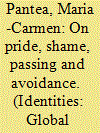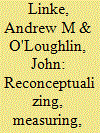| Srl | Item |
| 1 |
ID:
133835


|
|
|
|
|
| Publication |
2014.
|
| Summary/Abstract |
Roma ethnicity is one of the most stigmatised identities of today's Europe. An emerging discourse on 'Roma pride' aims to reshape this widespread perception, especially among the educated youth. Drawing on 57 interviews with young people with/in higher education in Romania, this article looks into their experiences of self-identification as Roma. On the one hand, this article identified a tendency for young people to move in a conceptual space, dominated by an understanding of ethnicity as bounded and static. On the other hand, it identified an emerging tendency for flexible, hybrid identifications that deliberately avoid reifying ethnicity (e.g. being a Roma of a different kind and living beyond ethnic labels). The article calls for more informed approaches addressing ethnic identification, which avoid assumptions of stable identification and embrace more complex understandings of the social dynamics involved.
|
|
|
|
|
|
|
|
|
|
|
|
|
|
|
|
| 2 |
ID:
137791


|
|
|
|
|
| Summary/Abstract |
How does political violence affect the attitudes and beliefs of affected populations? This question remains of central concern to the discipline of conflict studies. In response, we make the case (by empirical example) that the choice of spatial and temporal ranges of analysis influences conclusions about the associations between exposure to political conflict and subsequent opinions. Using 2005 survey data from Russia's North Caucasus and georeferenced conflict data for the preceding 2 years, we find that violence affects levels of ethnic pride, trust in public institutions, and preferences for ethno-territorial separation, as well as other postwar attitudes. By designating a wide range of distance and time boundaries for capturing a conflict/attitude relationship, we argue for a more inductive style of analyzing theoretical propositions than is usually found in the field of conflict research. Our research is framed within the theoretical and empirical discussions of contextual-, neighborhood-, and community-level drivers of individual-level outcomes from the political geography and conflict studies literatures.
|
|
|
|
|
|
|
|
|
|
|
|
|
|
|
|